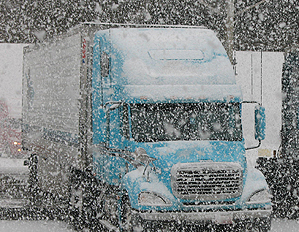Freight Index Suggests Slow Start to 2014
 North American shipment volumes and freight expenditures both continued the decline that began in December with January shipment levels the lowest since 2010.
North American shipment volumes and freight expenditures both continued the decline that began in December with January shipment levels the lowest since 2010.
According to the Cass Freight Index, although GDP figures for the second half of 2013 indicate that the economy is strengthening, this has not yet translated to the transportation sector. Some point to January weather, which hampered production as well as deliveries
Cass noted that the number of shipments dropped 3.6 percent from December 2013, and was 2.0 percent lower than a year ago. Freight shipment volumes follow a predictable trend.
January sees a post‐holiday drop‐off and is also the slowest month of the year. Volumes rise throughout the spring, flatten or even drop during the summer months, peak in August‐September, then fall close to the levels at which the year started.
Railroad carload and intermodal loadings – good barometers of the volume of freight moving – have trended down in the last three months. Snowy January weather contributed to the depressed figures. That being said, many of January’s other indicators do not point to a quick turnaround next month.
- The Institute for Supply Management’s PMI fell for a second month from 56.5 in December to 51.3 in January. (Keep in mind that anything below 50 indicates that the industrial economy is contracting.)
- Of further concern is the 13.2 point drop in the New Orders Index, the largest drop in new orders in 33 years. Along with the drop in new orders, the backlog of orders shrank as well.
- The PMI Production Index was down 6.9 points, the second drop in a row.
From a broader perspective, Cass noted that trucking capacity is at exactly the right level for the volume of freight today, but will become inadequate later this year if the predictions of a robust 2014 materialize.
Further, obtaining credit to purchase new vehicles will become more difficult, probably squeezing out smaller and marginal trucking companies that don’t have the capital to expand their fleet or ‐ almost as important ‐ modernize their fleets.
In sum, Cass predicts a bumpy ride ahead.
Category: General Update










